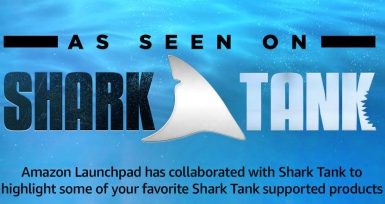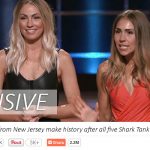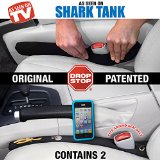 Beyond the Tank episode 203 aired Friday, May 6, 2016. Four past Shark Tank companies get an in-depth, 15 minute update segment on what their business life is like after Shark Tank and viewers get to see them interacting with their investor/sharks. Beyond the Tank episode 203 features Toygaroo, one of the biggest busts in Shark Tank history: the season two company declared bankruptcy a year after appearing on the show and getting an investment from Mark and Mr. Wonderful. Mango Mango didn’t get a deal in season five, but the business took off, so the Shark Tank producers wanted an update on their success. Neal Hoffman did a deal with Robert and Lori in season six and in the Beyond the Tank update, he reveals some new ideas and products. Aqua Vault scored a deal with Daymond in season six and this segment shows how well they’re poised for growth.
Beyond the Tank episode 203 aired Friday, May 6, 2016. Four past Shark Tank companies get an in-depth, 15 minute update segment on what their business life is like after Shark Tank and viewers get to see them interacting with their investor/sharks. Beyond the Tank episode 203 features Toygaroo, one of the biggest busts in Shark Tank history: the season two company declared bankruptcy a year after appearing on the show and getting an investment from Mark and Mr. Wonderful. Mango Mango didn’t get a deal in season five, but the business took off, so the Shark Tank producers wanted an update on their success. Neal Hoffman did a deal with Robert and Lori in season six and in the Beyond the Tank update, he reveals some new ideas and products. Aqua Vault scored a deal with Daymond in season six and this segment shows how well they’re poised for growth.
Each Episode of Beyond the Tank has these “back stories” and Shark Tank updates. We’ll recap them here.
Beyond the Tank Episode 203 Featured Sharks
- Investor – Kevin O’Leary
- Investor – Daymond John
- Investor – Robert Herjavec
- Investor – Mark Cuban
Beyond the Tank Episode 203 Entrepreneurs
- Company – Aqua Vault
- Company – Mango Mango
- Company – Mensch on a Bench
- Company – Toygaroo
Beyond the Tank Episode 203 Recap
Mensch on a Bench
Neal Hoffman brought Mensch on a Bench to Shark Tank in season 6. He presented the Sharks with a Jewish alternative to “Elf on a Shelf.” Neal was an executive at Hasbro, boosting his credibility with the Sharks. Lori Greiner and Robert Herjavec make him an offer: $150,000 in return for 30%. Neal counter offered, offering 15%, but offering guaranteed repayment of the $150,000 in 3 years. The Sharks accepted the offer.
“Lori and I invested in Mensch in a Bench,” says Robert, “Because we saw a real opportunity to create a holiday product around a very unique, narrow niche.”
In the year before Shark Tank, Mensch on a Bench had made $100,000 in sales. After Shark Tank, sales leapt to $930,000.
Having succeeded in the Shark Tank, Neal immediately got to work, taking the Shark’s comments about the design of the Mensch doll to heart. The Sharks said the doll looked “like a nervous old man,” so he redesigned the face to be more friendly and appealing.
Neal plans to meet with Robert and his “Sales Mensch,” David, to talk about a line expansion for 2016. IN the year after Shark Tank, sales increased to 62,000 units in about two months’ time. Now, he wants to add new products to the line. He introduces some of his ideas to Robert, including a plush menorah that allows very-young children to participate in the ceremonial lighting of candles, and that includes a sound chip that recites prayers for each night of Hanukkah.
Neal goes on to explain that he’s trying to expand into other holidays, like Passover. He begins presenting a variety of new products- wall clings, wrapping paper, and other small-ticket items that have earned, so far, only about $1,000 in profit.
Robert is concerned that Neal’s product expansions may be cannibalizing his Mensch sales, by taking up shelf space that should be dedicated to the original product.
“Neal’s got to be an inch wide and a mile deep,” says Robert. “Right now, he’s a mile wide and an inch deep.”
He has a pointed question for Neal: “Is the vision to make money? Or is the vision to continue the brand?”
Neal explains that his goal is to expand education and to become a part of family’s time together, to encourage education and the preservation of family culture. Robert is unconvinced that the add-ons have real value, but Neal has one more trick up his sleeve. He brings out “Bubbe,” a Jewish grandmotherly figure that plays humorous phrases like “Go sit on a bench and ask me again later” when her hand is pressed.
“This gets us out of religious items, into cultural items. So I think this has the potential that, when you get to the day after Hanukkah, you don’t have to clearance that out.”
Robert jokingly asks the doll, “Bubbe, are people gonna buy this,” pressing her hand. The doll declares, “Oy vey! I’m tired! All these questions.”
Neal explains that Bubbe is not an “or” product, it’s something that people who already have a Mensch will want to add to their collection.
Robert loves Bubbe, praising the idea of moving outside the holiday niche with an add-on product that doesn’t supplant the original product.
“Going forward,” says Robert, “Neal’s got to focus on which products to bring to market and which ones to put away, but if we do it right, Lori, Neal, and I could be in business for a long time, making a lot of Mensches and Bubbies.”
Neal has gained perspective from the meeting with Robert. “The Mensch on a Bench is all about legacy,” he says, “And what I’m leaving for my children, and making an impact on the Jewish community.”
Mango Mango
Partners Lakesha Brown-Renfro, Tanecia Willis, and Nzinga Teule-Hekima came to Shark Tank with their product, Mango Mango, in season 5. The ladies hoped to engage a Shark investor to help them achieve a lower production cost; to make their company more profitable and take Mango Mango to a long-term success.
Although the Sharks loved the product, the high production costs were a strong deterrent. One by one, the Sharks went out, and the ladies left the Tank with no Shark deal.
“After Shark Tank,” relates Lakesha, “even though we didn’t get a deal, we just said ‘we’re gonna hustle.”
The women took Kevin O’Leary’s advice. In an attempt to reduce their costs by at least 75 cents per unit, they switched from using a co-packer to their own production facility. Unfortunately, the smaller facility put a limit on how much product they could manufacture in a given time period.
The Shark Tank appearance led to an approach from QVC. Within 6 minutes of the presentation’s first airing, they sold out of product. QVC wanted them back the following week, but the production limits were overwhelming. The ladies weren’t able to keep up with the demand created by the appearances. They needed a second kettle, and a larger production facility, things a Shark investment could’ve provided.
The partners found an unlikely partner: their own home city. The city of Hampton approached the Mango Mango owners.
“They saw that we were built to last,” relates Lakesha. “and we’re going to stay around. They thought that we could help bring other businesses and entrepreneurs to the City.”
The City offered Mango Mango a grant which will help expand their production facility and open a bistro in the same building featuring Mango Mango’s products.
The Mango Mango partners put on a promotional opening, and celebrated the success of their venture. They look forward to a sweet future as business owners.
Toygaroo
Nikki Pope came to the Shark Tank in season 2, with her “Netflix for toys” idea- for a monthly subscription fee, parents can order their choice of children’s toys, then return them when they’re ready for a fresh shipment. She had her eye on Shark Kevin O’Leary, for his experience and connections.
Kevin makes her an offer of $100,000, in return for 35%. Before Nikki can respond, Robert Herjavec speaks up, partnering with Mark Cuban to offer $200,000 for 40%. Nikki likes the higher number, but Kevin’s not done. He matches the deal, cutting Robert out and including Mark to raise $200,000 in return for 40%.
“Mark and Kevin came in together,” remembers Nikki, “And I’m sold. By having Kevin come in with all of the toy experience, and knowledge that he had, coupled with Mark and his incredible internet knowledge, it was the perfect marriage and the perfect deal.”
Kevin is confident in his decision. “I invested in Toygaroo because I understand the toy business,” he says. “I sold my company, The Learning Company, to Mattel, and I liked the basic premise [Toygaroo] had.”
Prior to Shark Tank, Nikki had 30 subscribers. After her appearance, subscriptions jumped to 1,200. Toygaroo was shipping 20-30 boxes of toys per day. Soon, however, the success created new pressures and problems.
“I was feeling so hopeful and excited,” says Nikki, “but this is an incredibly expensive business model. Every customer we signed up represented $90 worth of toys we had to purchase, plus the shipping there and back. So, for every customer that was signing up, we needed more toys, more toys, more toys.”
Nikki was working 8-10 hour days with one other employee, trying her best to keep Toygaroo afloat.
“Mark and I met with Nikki a number of times,” remembers Kevin. “Had phone calls with her, talked to her, tried to give her more advice, but she had staffing problems, logistics problems, she had competition, and they dropped their price by providing free shipping, and it wasn’t pretty.”
Toygaroo wasn’t profitable, Nikki was working herself to death, and something needed to change.
“They wanted me to be a tougher, stronger CEO,” recalls Nikki. “They wanted me to push harder across the board, so that we could grow and make money. And so, what I did was write a press release.”
Good Morning America contacted her and invited her to appear just before Christmas.
Although the exposure was positive, Kevin had some concerns. The delivery system wasn’t strong enough to handle the influx of new customer interest, and Nikki’s already overburdened system was in danger of collapse. Nikki had to approach the Sharks for an additional investment, to buy more toys. The Sharks refused.
Eventually, the demand for toys outpaced Nikki’s ability to ship new toys out. The company filed for bankruptcy on April 6, 2012.
“It was my baby,” says Nikki, “and I will always the blame, and it will always be a heartbreak for me.”
“Toy garoo was very disappointing,” says Mark. “But there’s a lesson to be learned. “Next time, get more media, and spend more time dealing with the essential elements of the company.”
Kevin hasn’t given up on Nikki. “I like entrepreneurs who’ve failed a couple of times, because they learn the sting of failure can be a great motivator for the future. They’ll be successful sometime down the road.”
“At the end of the day,” says Nikki, “I’m taking everything I’ve learned, and I’m going to use it to be a success.”
Aqua Vault
Rob Peck, Avin Samtani, and Jonathan Kinas came to Shark Tank in season 6. They’d sold 250 units to hotels, in hopes of creating rental programs. They’d entered talks with several major water parks.
Daymond John liked what he saw, and offered the trio a deal. “When I saw these guys in the Tank, I fell in love with them. I figured I could bring my marketing, my production, and my knowledge of retail to this company, and become a world-wide brand.”
Before Shark Tank, the trio’d been able to reach $87,000 in sales. In the 3 months after landing a Shark deal, sales had jumped to $500,000. To this point, Aqua Vault has been self-funding, with all the profits being plowed back into the company. The trio hope to increase profits and begin taking salaries from the company.
Aqua Vault is facing a problem many small businesses run into. They’ve reached a point at which they’re taking in large orders, but don’t have the capital to meet production. They plan to approach Daymond for advice and possibly to loosen the purse strings and increase production abilities.
Aqua Vault has met with a major park, and a major order is on the horizon. Daymond has already given them production help and lowered their costs substantially. He feels he’s already helped the company, and wants the men to come up with creative approaches to solving their problems.
“I want to teach them the skills to grow the entire business,” says Daymond.
Daymond is unwilling to risk a further investment. Aqua Vault is a unique product, and he feels the market is strong enough to withstand relatively minor production delays.
“The key to being an entrepreneur is affordable next steps,” says Daymond. He recommends that the partners offer their current customers a discount for upfront payments, increasing their cash flow.
The meeting with the water park executives goes well. The aquatic parks have decided to expand the line into their other parks. The entrepreneurs request a discussion about terms with the parks’ procurement team, as Daymond has recommended.
“The guys just called me, and the Seaworld Aquatica meeting went amazing. I am so glad that the guys believe in me, and I believe in them,” says Daymond. “This is a pivotal time for this company, and we’re off to the races.”







Recent Comments